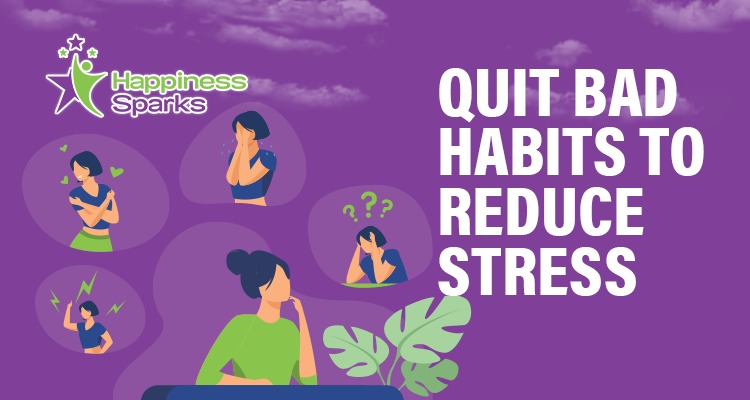
One of the keys to leading a healthy, happy life is learning how to manage your stress levels. We talk about how you can reduce stress by finding a new habit or breaking an existing one. We all have our behavioural patterns. Whatever the reason, having unhealthy habits can significantly increase our stress levels.
Think about it – Is your glass half full or half empty? Your response to this venerable question on positive thinking could reveal your outlook on life, how you feel about yourself, whether you’re optimistic or pessimistic, and even how your health is affected.
According to certain studies, personality qualities like optimism and pessimism can impact your health and well-being. Stress management depends on optimistic thinking that aids in diversifying thoughts and diverts into a constructive routine of happiness. An effective stress management technique is to go on a social media fasting and digital detoxification. This can be done through a day in a week without gadgets or without internet connection. These will bring more positive vibes of reducing the social media stress of analysis.
When constructive habits are neglected, it can lead to anxiety and panic attacks. To overcome them, coping strategies aid to dissolve the stressful stimulus.
So, what's the solution?
It’s simple – quit your behavioural habits! Breaking a behavioural habit can be challenging but worth it in the long run. You’ll not only feel better physically, but it will also be simpler to manage the tensions in your life.
If you’re prepared to improve your health and reduce stress, you are already ahead to achieve quitting habits that dissolve your performance. Start by giving up unhealthy behaviours!
This blog assists you in how you can choose to quit behavioural patterns that have a stressful impact on you.
Introduction:
When it comes to reducing stress, one of the best things you can do is quit your behavioural habits. unhealthy routines, such as talking negatively to yourself, affect your physical health and increase anxiety and stress levels.
If you want to live a healthier and less stressful life, you might want to give up some of the following detrimental habits:
- Filtering. You emphasise a situation’s drawbacks while eliminating all its advantages. For instance, your day at work was fantastic. You were praised for working quickly and thoroughly since you finished your responsibilities ahead of schedule. You ignore the accolades you received and concentrate solely on your plan to complete additional work.
- Personalising. When something goes wrong, you immediately place the blame on yourself. If, for instance, you learn that a night out with friends has been cancelled, you might infer that this is because no one wants to be near you.
- Catastrophizing. Even without evidence, you instantly assume the worst will happen. Your order is misplaced at the drive-through coffee shop, and you begin to fear for the rest of your day.
- Blaming. You attempt to shift blame away from yourself and place it on another person. You avoid taking responsibility for your feelings and thoughts.
- Implying something you “should” do. When you consider all the things you ought to be doing, you blame yourself for not doing them.
- Magnifying. You oversimplify seemingly minor issues.
- Perfectionism. You set yourself up for failure by maintaining unattainable standards and attempting to be flawless.
- Polarising. You only consider things to be either excellent or terrible. There isn’t a neutral position.
What is the Cause of Your Stress?
The leading causes of stress are negative behavioural habits that include negative Self- talk, self-sabotages, dominating, being late to meetings, not listening well, time management, and destructive behaviour. Other stress causes include not getting enough sleep, not exercising regularly, and lacking control of money, time, social relationships, etc. To reduce your stress levels, stop these toxic behavioural habits.
What is the Solution to Your Stress?
- Determine what needs to change. If you wish to have a more cheerful outlook on life, start by identifying the things that trigger negative stress or distress to you. This will help you convert your distress and eustress or positive diversion of your identified triggers. Instead of thinking negatively to reduce your stress, try to think positively.
- Examine yourself. Stop periodically throughout the day to assess your thoughts. Try to find a way to reframe your ideas if you notice that they are primarily negative.
- Be humorous-minded. Especially during trying moments, give yourself permission to smile or chuckle. Look for the humour in mundane events. Life is more enjoyable when you can laugh about it.
- Maintain a healthy way of living. Try to work out for 30 minutes or more most days of the week. Alternatively, you can do it in 5- or 10-minute intervals throughout the day. Exercise can improve mood and lessen stress. Consume a balanced diet to keep your body and mind healthy. Take time to rest. Moreover, develop stress management skills.
- Be in the company of uplifting individuals. Make sure the individuals you surround yourself with are upbeat, encouraging, and capable of providing insightful feedback. Negative people might make you feel more stressed and doubt your capacity to handle stress healthily.
- Engage in constructive self-talk. A decent starting point is to never say something to oneself that you wouldn’t say to a friend. Be kind and supportive of yourself. When a negative thought arises, analyse it logically and counter it by focusing on your positive traits. Consider the aspects of your life for which you are grateful.
Importance of Breaking Behavioural Habits
It’s no secret that behavioural habits can sabotage our lives. They can make us feel stressed, anxious, and down in the dumps. But did you know that breaking behavioural patterns can help reduce stress?
That’s right! When we break behavioural habits, we make a positive change in our lives that can reduce stress levels. Here are some pointers for quitting destructive behaviours:
- Identify your behavioural habits. What is it that you want to change?
- Set a goal. What do you hope to achieve by breaking this habit?
- Have a plan. How are you going to go about breaking this habit?
- Act! Start executing your plan and achieving your goal.
- Be patient and persistent. It takes time and work to break unhealthy habits, but it’s worth it!
Hitting Rock Bottom
Hitting rock bottom is often used to describe the lowest point in someone’s life. It can be a financial, emotional, or physical low point. However, hitting rock bottom can also be a good thing. It can be the catalyst for the change needed to improve your life.
If you are struggling with a behavioural habit, hitting rock bottom may be what it takes to quit. You may feel like you have nothing to lose when you reach this point. This can be a powerful motivator to make changes in your life. You may be tired of the negative consequences of your behavioural habit and ready to change.
Considering quitting a behavioural habit, consider why you want to do it. Are you doing it for yourself or someone else? What are your goals? What are the potential benefits of quitting? Once you have decided that leaving is right for you, plan and stick to it. Even though change can be challenging, it is achievable. You deserve to be free from the detrimental effects of poor habits and lead a happy, healthy life.
Power of Small Steps and Steps to Begin Breaking Behavioural Habits
We want changes in our life to occur quickly, whether to shed pounds, get in shape, or organise the family garage. However, change takes time, and it sometimes takes many repetitions for new habits to sink in. Experts concur that rushing into any significant move is rarely a wise idea.
A more effective method to cultivate changes in daily lifestyle routines includes
Taking small steps to achieve your objective. Here’s how and why taking small, consistent steps can increase your chances of success.
- Our brains are structured to prevent us from repeating challenging, complex, or upsetting experiences. A “no pain, no gain” philosophy makes it simpler to give up on our objectives. Instead, ease up a bit. Make sure to infuse each tiny step toward your goal with playfulness, fun, or at the very least, ease.
- Get rid of unrealistic, nebulous goals such as “I’m going to lose 20 pounds,” and replace them with targeted, doable steps. Reducing your soda consumption may be your first step to losing weight. Once you’ve done that, add one more quick action to get you closer to your weight loss objective.
- Know who you are. We frequently sabotage our efforts to get better by making changes more complicated than they need to be. Sometimes we seek external support systems through applications and software as reminders and habit trackers. Will this pricey software or applications manage and read your daily habits or aid in motivation? Are you inclined to continue running with a group in the morning even though you often ignore your alarm? Setting realistic goals is possible if you are honest about your advantages and disadvantages.
- Try to find “micro-moments.” Keep an eye out for little methods to progress toward your objective throughout the day. A few seconds matter. Try glancing up from your smartphone and making eye contact with your partner while speaking to improve communication. Try using the stairs at work instead of the escalator to get extra exercise.
- Be steadfast. Be patient to implement new habits into your lifestyle as any habit requires 21 days of continuous practice and patient efforts. Significant changes take time to manifest. Keep a notebook of your daily accomplishments to stay on course and track your progress.
- Remember to have fun. When we don’t meet expectations, we tend to be harsh on ourselves, but rewarding ourselves for even minor accomplishments helps us stay motivated. Treat yourself to a new mug and herbal tea when you stop drinking coffee. After going for a few days on walks with friends, download some new songs. Our unconscious mind prompts us to resume these beneficial activities when we receive rewards, even from ourselves.
Conclusion
Quitting behavioural habits is a great way to reduce stress in your life. Expecting to change your viewpoint overnight if you tend to be pessimistic is unrealistic. But with time and effort, you’ll soon notice that your self-talk contains less self-criticism and self-acceptance. Additionally, you might start to lose your sense of self-criticism.
When you are generally upbeat, you can better deal with daily stress more beneficially. The well-documented health advantages of sensible positive thinking may be attributed partly to that capacity.
